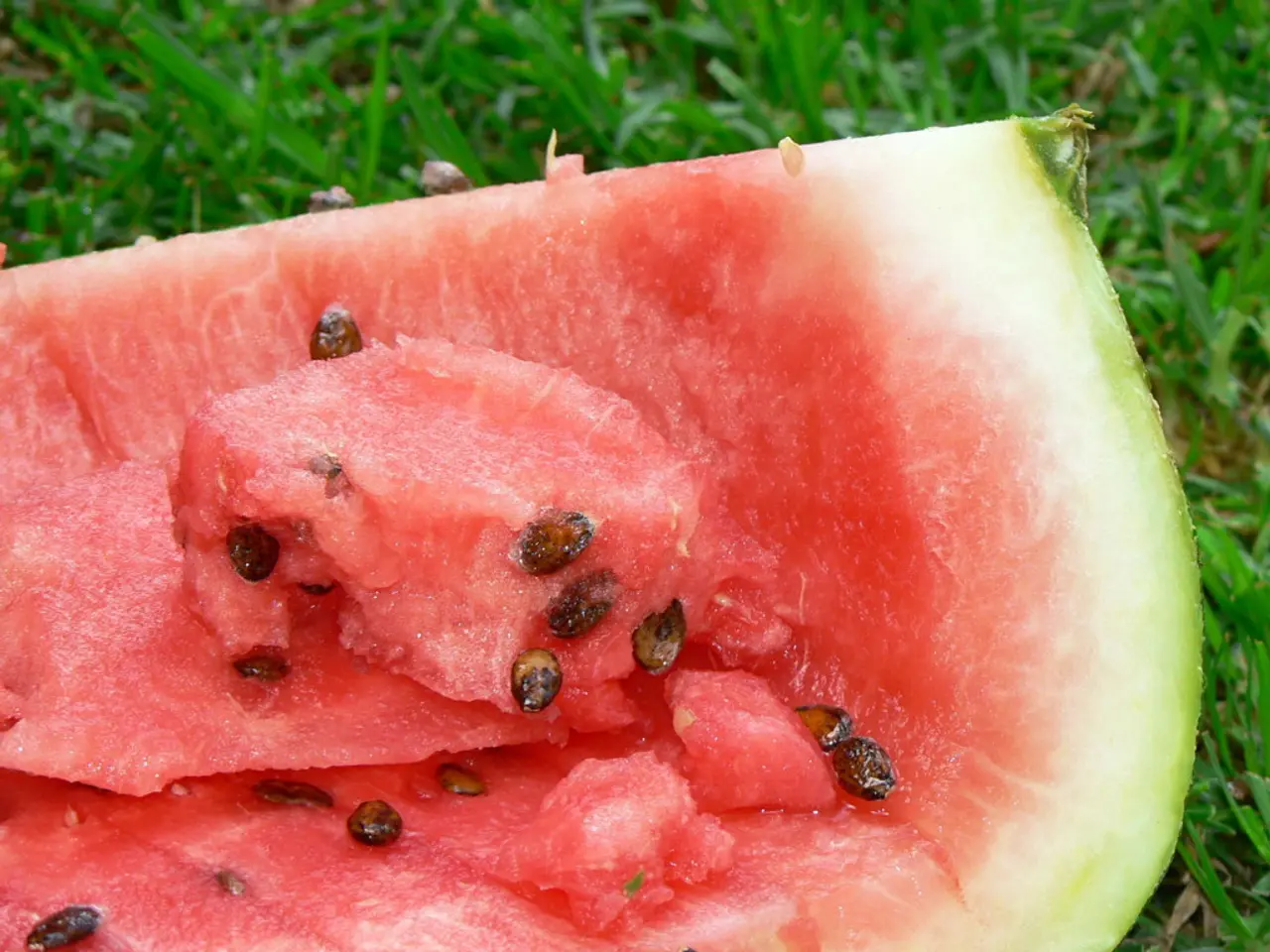Consuming Watermelon as a Dietary Essential
Watermelon: A Hydrating Summer Superfood
Watermelon, a refreshing summer staple, is more than just a tasty treat. Packed with essential nutrients and disease-fighting antioxidants, this juicy fruit offers numerous health benefits.
Firstly, watermelon is an excellent way to hydrate, as it is 92% water. But it's not just the water content that makes watermelon a standout choice. Its nutrient profile is impressive too.
Health Benefits of Watermelon
- Hydration: Watermelon's high water content makes it an ideal choice for staying hydrated.
- Antioxidants: Watermelon is rich in lycopene and cucurbitacin E, powerful antioxidants that help fight diseases.
- Immune System Boost: The vitamin C found in watermelon gives a significant boost to the immune system, potentially reducing the risk of developing cancer.
- Blood Sugar Management: With few carbs and a low glycemic load, watermelon provides a great alternative for managing blood sugar levels.
- Skin Health: Vitamin C in watermelon aids skin health by producing collagen, supporting the immune system, and promoting cell health and healing.
- Eye Health: Watermelon's vitamin A supports the health of corneas, potentially preventing or delaying cataract formation and reducing the risk of age-related macular degeneration.
- Weight Management: Early evidence suggests that regularly eating watermelon may help manage weight by reducing hunger and lessening the desire to eat.
- Chronic Disease Prevention: Regular consumption of watermelon may reduce the risk of chronic diseases such as diabetes, obesity, cardiovascular disease, and cancer.
However, watermelon should be avoided by those prone to migraine headaches, those with allergies to certain pollens, people with diabetes, and those with digestive issues such as IBS.
Exploring Watermelon's Lesser-Known Parts
While the flesh of the watermelon is well-known, its seeds and rinds also offer specific health benefits.
Health Benefits of Watermelon Seeds
- Cardiovascular Health: Rich in magnesium, potassium, healthy fats, and arginine, watermelon seeds support heart health by managing blood pressure and cholesterol levels.
- Skin Health: Packed with antioxidants like Vitamin E, magnesium, and zinc, watermelon seeds protect skin cells and maintain skin elasticity and hydration.
- Hair Growth: With nutrients like iron and zinc, watermelon seeds contribute to hair strength and growth.
- Protein and Iron: Watermelon seeds are a good source of protein and iron, contributing to overall health.
- Low Calorie: Watermelon seeds are low in calories, making them a nutritious snack option.
Health Benefits of Watermelon Rinds
- Fiber and Antioxidants: Watermelon rinds are rich in fiber and antioxidants, making them beneficial for digestive health and reducing oxidative stress.
- Citrulline: The rind contains citrulline, which converts to arginine in the body. Arginine improves blood flow and may help with conditions like erectile dysfunction, though indirectly.
- Nutrient Content: Watermelon rinds have less sugar and more nutrients than the fruit itself, including vitamins and minerals.
- Hydration: Similar to watermelon, the rind contributes to hydration due to its water content.
Both the seeds and rinds can be incorporated into diets through various preparations, such as salads, smoothies, or as roasted snacks.
In conclusion, watermelon is more than just a refreshing summer snack. Its nutrient-rich profile offers numerous health benefits, from hydration and improved digestion to skin and heart health. However, it's important to remember that moderation is key, and those with certain health conditions should consult a healthcare professional before incorporating watermelon into their diet.
- For a hydrating and nutritious lifestyle, consider adding watermelon to your food-and-drink choices.
- If you're looking to boost your health-and-wellness, you might want to explore watermelon's many health benefits.
- Watermelon's high water content makes it an excellent choice for workplace-wellness initiatives due to its hydrating properties.
- Science shows that watermelon is not only refreshing but packed with antioxidants that fight diseases.
- To ensure healthy-diets and avoid high sugar intake, opt for recipes using watermelon in global-cuisines.
- Medicare benefits can include reimbursement for certain therapies-and-treatments, such as those aimed at managing weight or supporting heart health, often associated with watermelon consumption.
- If you're looking for a natural way to manage stress and inflammation, consider incorporating CBD products into your current skin-care routine.
- Learning about nutrition and its role in our lives is crucial for education-and-self-development, and watermelon can be a great topic to explore as a part of this journey.
- When shopping for groceries, don't forget to take a look at the skincare, health, and food-and-drink sections for products related to watermelon.
- To stay informed about the latest trends in health, wellness, and lifestyle, follow authors, experts, and brands discussing these topics on social media.
- If you enjoy cooking and experimenting with recipes, consider adding watermelon to your list of ingredients to explore its versatile uses.
- Beyond just nutrients, incorporating watermelon into your diet can help with weight management and reduce the risk of chronic diseases.
- Keep up with the latest books, articles, and product reviews on watermelon and its lesser-known benefits to further educate yourself on its health advantages.
- As fans of entertainment-and-pop-culture, it's worth noting the role watermelon plays in various aspects of our lives, from TV and movies to music and art.
- For a more focused and in-depth understanding of sports, follow sports analysis on basketball, NBA, and other popular sports, often discussing the role diet and nutrition play in athletes' performance.




